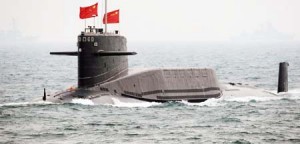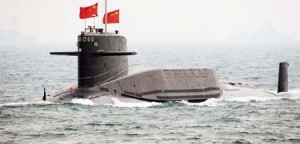Foreign Policy Magazine
PAUL MCLEARY
The commander of American forces in the Pacific is worried that the United States doesn’t have enough submarines to meet the rapidly modernizing fleets being put to sea by China and Russia — and that things will only get worse before they get better.
The U.S. Pacific Command “suffers shortage of submarines today, my requirements are not being met,” Adm. Harry Harris told the House Armed Services Committee Wednesday. Harris said he’s most concerned that the Pentagon’s plan to modernize its own fleet may not move fast enough to keep pace with its Pacific rivals.
Most worrisome is the building spree that Russia and China are conducting to bolster their submarine assets in the Pacific. Late last year, Russia completed improvements to its naval base on the Kamchatka peninsula in the northern Pacific in part to accommodate new nuclear-powered Borei-class ballistic missile submarines. The boats are designed to carry 16 Bulava ballistic missiles each. A total of eight of the vessels are planned by 2020.
Harris said that Russia “has the most capable submarine force in the world after ours.”
China has already built four nuclear-powered ballistic missile JIN-class submarines, with an unknown number still being built.
But under the terms of the U.S. Navy’s own long-range shipbuilding plan, that will become increasingly difficult. The plan calls for the number of attack submarines to fall from 52 today to 41 in 2028 before gradually clawing back to 50 by 2044.
Harris also repeated his plan to carry out more so-called “freedom of navigation” operations in the South China Sea, where China has engaged in a land grab in recent years and built islands in order to push its territorial claims further out to sea.
“We will be doing them more, and we’ll be doing them with greater complexity in the future, and as the secretary [of defense] has said, we’ll fly, sail and operate wherever international law allows,” Harris said. “We must continue to operate in the South China Sea to demonstrate that that water space and the air above it is international.”
Testifying before a Senate committee on Tuesday, Harris said that “China is clearly militarizing the South China Sea,” adding “you’d have to believe in a flat earth to believe otherwise.”
China has grown increasingly assertive in its claims to territory in the South China Sea, embarking on an ambitious — and controversial — island-building project in the critical waterway. On Tuesday, as Chinese Foreign Minister Wang Yi met with Secretary of State John Kerry at the State Department, reports emerged that Beijing had sent fighter planes to Woody Island in the South China Sea, the same island that Beijing recently deployed HQ-9 surface-to-air missile batteries. The deployment of the J-11s Flanker and JH-7s Flounder aircraft raised tensions even further between China and its neighbors Taiwan and Vietnam, who also claim rights to the island.
Last month, a U.S. Navy destroyer sailed within 12 nautical miles of Triton Island in the Paracel chain in a show of force that Beijing said only increased tensions in the region. The U.S. also flew two B-52 bombers near artificial islands that China has built in the Spratly Island chain in the South China Sea in November.
Harris roundly dismissed Chinese criticisms of American freedom of navigation patrols as being provocative. Asked about comments from a Chinese Foreign Ministry spokesperson earlier this week that Beijing’s deployment of surface-to-air missiles to a disputed island in the South China Sea “is not substantively different from the United States defending Hawaii,” Harris shot back, “it’s ridiculous, and to me it’s indicative of the spokesperson’s tone-deafness.”




